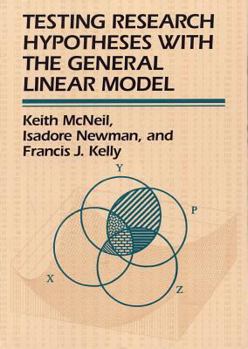Testing Research Hypotheses with the General Linear Model
Select Format
Select Condition 
Book Overview
Because the technique of multiple linear regression has been accepted by the research community since 1975, Keith McNeil, Isadore Newman, and Francis J. Kelly devote little space to defending the equivalence of correlational and ANOVA procedures with multiple linear regression. Instead, they show how the multiple linear regression technique frees the researcher from wondering if an analysis can be done and refocuses him or her back to the central concern: the research question itself.
The first three sections of chapter 1 provide a conceptual, research, and statistical orientation to the entire text. The remainder of chapter 1 furnishes the rationale for the utility of a conceptual model of behavior, along with one such model that can be used to identify predictor variables. The authors strongly suggest that readers familiar with the general linear model read these three sections before delving into the more advanced material. Readers who are relatively unfamiliar with the general linear model should read the first eight chapters before branching off into topics that are of immediate interest.
Examples are provided throughout the text, all using the same data in the same widely available statistical analysis package. Although the technique can be taught with matrix algebra, the authors use the simpler approach of vector algebra, an approach more in line with the way data are conceptualized and entered into the computer.
All of the correlational statistical techniques are shown to be subsets of the general linear model. Of more importance, however, researchers are encouraged to think beyond these limitations and to ask the research questions they are interested in. Thus, the common researcher is freed from the shackles of the "right" statistical procedure and its associated "right" computer analysis.
Related Subjects
Education & Reference Math Mathematics Reference Science & Math Statistics Textbooks




